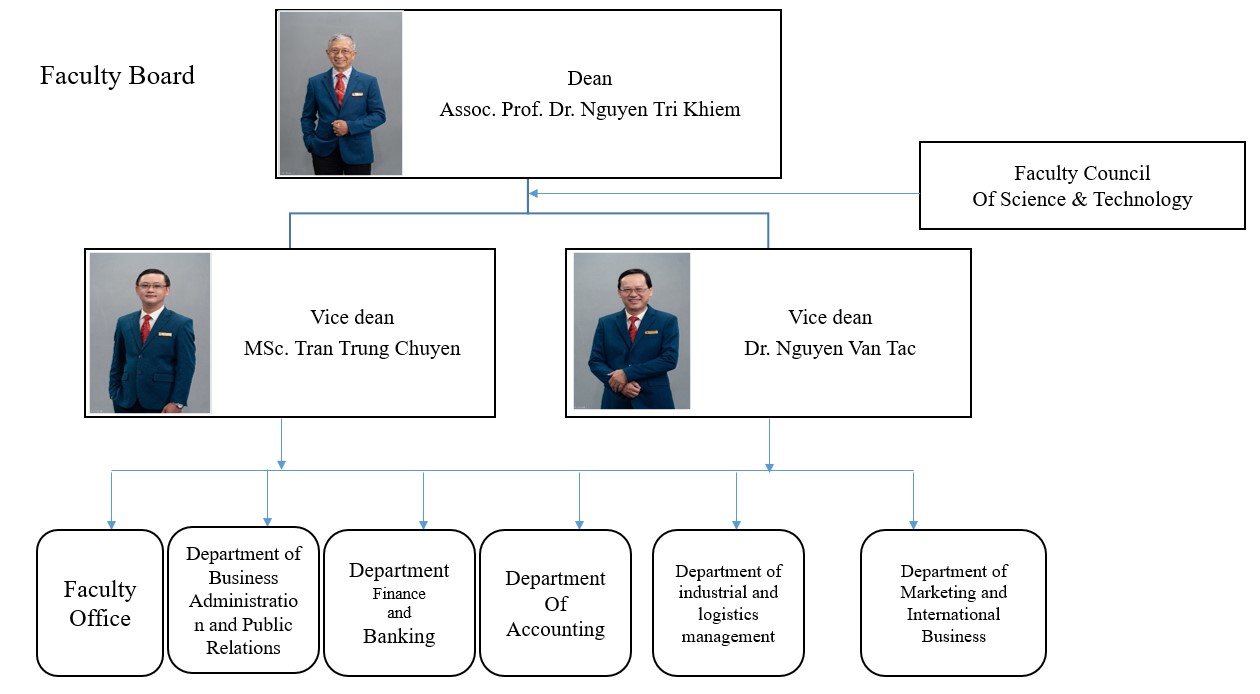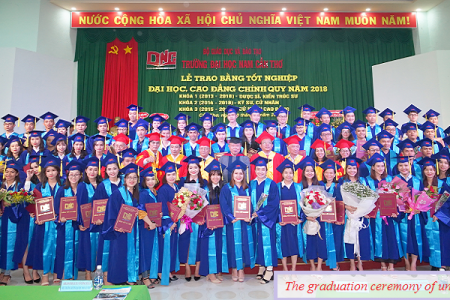Apr 20,2023
Faculty of Economics
FACULTY OF ECONOMICS
1. INTRODUCTION
Along with the development of Nam Can Tho University, the Faculty of Economics, with its rich tradition in education, research, and technology transfer, has continuously grown and contributed to the development of human resources ranging from bachelor's to master's degrees in the fields of economics and management. The Faculty of Economics was formed during the establishment of Nam Can Tho University. When it was first established, the Faculty of Economics had two departments: Business Administration and Accounting-Finance-Banking. From 2015 to 2018, six more departments were established, including the Department of Economic Law, the Department of Accounting, the Department of Public Relations, the Department of Tourism and Hospitality Management, the Department of Real Estate Business Administration, and the Department of Finance separated from the Accounting-Finance Department. In 2018, the Department of Economic Law separated to form the Law School. In 2020, the Department of Tourism and Hospitality Management was split to form the Tourism and Hotel Management Faculty. In 2022, after the departments were split into separate schools, the Faculty of Economics now has five departments, including Accounting, Finance-Banking, Business Administration and Public Relations, Industrial Management and Logistics Administration, Marketing, and International Business.

Currently, the Faculty of Economics offers 11 undergraduate programs, 01 advanced undergraduate programs in business administration, a business administration undergraduate program in partnership with the Malaysian University of Science and Technology (MUST), and 02 master's degree programs in business administration and economic management. All training programs are built to CDIO standards. In 2022, the university and the Faculty of Economics opened a doctoral program in business administration.
2. FUNCTIONS AND RESPONSIBILITIES
The Faculty of Economics performs the task of building, updating, and adjusting the training programs of the fields under the Faculty of Management. It is responsible for professional expertise in bachelor's, master's, and doctoral training at the university. Lecturers participate in teaching by continuously improving teaching methods and combining various methods of assessing the learning outcomes of students. In addition, lecturers also regularly update and improve their knowledge and professional qualifications to ensure teaching and scientific research activities.
Scientific research: Based on the functions and tasks of the officers and lecturers of the Faculty of Economics, the Faculty carries out its annual scientific research tasks through scientific research topics at the grassroots level, provincial/city level, etc. In addition, the faculty's staff and lecturers also participate in compiling textbooks, specialized books, lesson plans, and question banks and publishing research articles in reputable journals at home and abroad.
Quality assurance of education: The Faculty of Economics carries out the task of quality assurance of the training programs assigned by the University. In addition, the Faculty also cooperates with specialized units in the work of quality assurance of university education facilities; evaluating according to the UPM ranking system.
Community service: In each academic year, the Faculty of Economics coordinates with the Faculty Union and the University Union in charitable activities such as visiting and giving gifts to elderly people living alone, and orphans, and giving Mid-Autumn Festival gifts to children. It also mobilizes volunteers to contribute to charitable activities of the Faculty and the University.
3. HUMAN RESOURCES
After the process of formation and development, the organizational structure of the Faculty of Economics – Nam Can Tho University currently includes: the Faculty's Board of Deans, the Faculty Council, the Department of Business Administration and Public Relations, the Department of Finance and Banking, the Department of Accounting, the Department of Industrial Management and Logistics Administration, the Department of Marketing and International Business.

Lecturers and staff of the Faculty of Economics currently hold a master's degree or higher, including associate professors and PhDs with high-level expertise to ensure teaching and scientific research activities. The teaching team at the Faculty also includes a group of guest lecturers from universities both domestic and foreign, businesses, organizations, and banks who participate in teaching and sharing knowledge and experience for learners.
4. ACTIVITIES
During the formation and development process, with the guidance of the School Council and the efforts of the faculty, the Faculty of Economics has carried out many activities and achieved outstanding achievements as follows:
In terms of training: Over the past 10 years of formation and development, the Faculty of Economics has provided society with approximately 3,200 bachelor's degrees in economics and 60 master's degrees. As of the current time, the Faculty of Economics has trained four cohorts of Master of Business Administration (from 2018-2021), of which the 2018 cohort has graduated and the 2019 cohort has defended their thesis and is awaiting graduation recognition. Currently, over 90% of graduates have stable employment, and most MBA graduates are holding positions in universities, research institutes, government agencies, and businesses in the economy. The bachelor's and master's programs in business administration meet the accreditation standards of the Ministry of Education and Training. In addition, the Faculty of Economics collaborates with the Training Management Department to develop new training programs in accordance with the requirements of the university, such as Logistics and Supply Chain Management, Marketing, E-commerce, and Industrial Management, and to design and develop an advanced program in Business Administration. Furthermore, the Faculty of Economics has also designed a Doctor of Business Administration program to meet the university's needs.
Regarding scientific research: The number of scientific research topics at various levels during the period from 2015 to 2022 is as follows: 3 provincial-level research topics and 8 university-level research topics. The number of research topics conducted by the faculty members of the Faculty of Economics as project leaders or participants and have been accepted is 15 topics (Basic level and Provincial level). Each year, the faculty members of the Faculty have papers published in reputable scientific journals both domestically and internationally. Many textbooks and teaching materials authored by the faculty members of the Faculty have been published, including some that have been reprinted multiple times to serve teaching and learning activities.
5. DEVELOPMENT ORIENTATION
Based on the functions, tasks, and achievements of the Faculty of Economics, the development orientation of the Faculty of Economics until 2025 and the vision until 2030 are as follows:
First, continue to improve and enhance the quality of the faculty, lecturers, and staff of the Faculty, with sufficient quantity, strong quality, sufficient qualities, and abilities to well fulfill the tasks in the education and training innovation movement, improving the quality of education and training of specialized human resources for the industrialization and modernization of the country. Select and train a team of highly qualified lecturers who have studied at reputable educational institutions worldwide.
Second, continue to consolidate and develop the disciplines under the management of the Faculty to maintain its leading role in education and scientific research; build a highly applicable curriculum framework that equips students with a solid political ideology, and diverse and in-depth knowledge, thereby helping them develop their thinking and integrate well into the business environment.
Third, enhance the ability to conduct scientific research for the faculty and students currently studying at the School. The scientific research should be highly applicable, meeting the needs of socio-economic development, linking learning with practice, and the school with society.
Fourth, collaborations within the region will be established to improve the effectiveness of training and scientific research activities. Relevant research activities will be closely linked to serving the social and economic needs of the region. Collaborations with reputable universities and external organizations will be established to learn from and exchange experiences in training and scientific research activities.
The Faculty of Economics provides an ideal environment for staff, faculty, and employees to demonstrate their professional skills, and assist and guide generations of students to fulfill their dreams. The faculty always supports and cares for each other in work and life, where it is like a second home, a warm and welcoming family where everyone treats each other as close brothers and sisters. The school leadership always pays attention and provides support for staff, faculty, and employees. Therefore, the passionate and dedicated team of young lecturers always strive for the development of the school, step by step achieving the goals, vision, and mission that the school has set out.
DIGITAL ECONOMICS
In the era of the Fourth Industrial Revolution, people have gradually heard more about the concept of the Digital Economy. It is an application platform for developing the economy that keeps up with the trends of the times. The Digital Economy has become increasingly popular and seems to be an inevitable trend for any country that does not want to fall behind. Realizing this trend, most developed economies in the world have adopted strategies for developing digital technology associated with economic growth. The United States, where the explosion of computer technology originated with many famous companies such as Google, Amazon, Facebook, and Apple...has identified the importance of the Digital Economy. In Europe, there is a plan for a "Single Digital Market," while Australia has a "Digital Australia." With a population of nearly 100 million people, Vietnam is considered one of the countries with a relatively high level of development in the ASEAN region. The Digital Economy is "an economy mainly operated based on digital technology," especially electronic transactions conducted via the Internet. The Digital Economy is present in all sectors and economies (industry, agriculture, services; production, distribution, circulation of goods, transportation, logistics, banking, and finance,...). In essence, these are organizational models and methods of operation of the economy based on the application of digital technology and data to create new business models. In the Digital Economy, businesses will innovate traditional production and business processes towards an ecosystem model, linking production and trade to use. This will increase productivity as well as labor efficiency. Training objectives:
Train a team of human resources with basic knowledge of big data, information technology, and economic management in the digital age;
In-depth knowledge of digital business platforms and leadership skills to transform organizations, companies, or corporations;
In-depth knowledge of business and commerce based on digital platforms; digital marketing, data security and privacy, computer networks, and communications in the digital economy.
Knowledge of designing, operating, and exploiting tools on digital platforms to develop businesses, thereby enhancing the competitiveness of enterprises, helping to develop startups, and fostering innovation.
Independent research thinking; the ability to self-study and improve professional knowledge, and adapt to changes in the technology development environment.
Train human resources with scientific research skills, planning skills, and proposing appropriate business solutions for organizations,...
Career Opportunities:
After graduating, students have enough knowledge and skills to conduct research, develop knowledge, and participate in postgraduate training both domestically and internationally. They can independently carry out scientific research projects and produce products related to digital technology, and digital transformation in the economy and business.
Moreover, they can take on job positions such as project planners and managers in digital transformation, economic information security, and safety in central and local government agencies, banks, financial companies, online businesses, and commercial companies.
They can also work as specialists in managing online business systems, and distribution channels for manufacturing enterprises, economic conglomerates, trading, and service companies. They can also work as website administrators for organizations or businesses. They can research and teach about digital economics and digital business at research institutes, universities, and colleges.
In addition, they can work as specialists or managers in e-commerce solutions and digital business platforms. They can also provide advice on digital transformation solutions for companies that need to innovate their traditional production and business processes to an ecosystem-based model, linking production, commerce, and usage.
Duration of training: 4 years (equivalent to 8 semesters).
MULTIMEDIA COMMUNICATIONS
Multimedia Communications is a "hot" field of study that attracts young, dynamic, and creative individuals with a passion for information technology, communication, or art. As technology develops, the field of communication has also grown, diversifying into many forms of information transmission through social media platforms and various sophisticated mass media. Communication plays an important role in direct participation in planning and implementing PR scripts, graphic design, content editing, and sound and image processing, all of which contribute to the production of communication products such as television, broadcasting, advertising, digital newspapers, games, movies, and animation.
Introduction:
Multimedia Communication is an integrated field of knowledge between communication and information technology, to design content, creativity, and building high-applicability products in the field of communication such as advertising, education, journalism, film-making, web design, gaming, entertainment, applications, etc. Almost all modern communication products (advertising, television, internet...) and entertainment (games, movies, animation...) that we use today are products of multimedia communications.
Training objectives:
The Multimedia Communication major equips students with basic knowledge of multimedia technology, professional technical expertise, and creative sensory perception.
The ability to plan and ideate communication campaigns, advertising, and design high applicability products in various fields of social life.
Train a workforce with basic knowledge of big data and information technology in the digital age.
Provide foundational knowledge in art and information technology, and master skills in communication and journalism to be able to independently create various print products, such as advertising banners, catalogs, book design, stories, video content creation, website design, applications, etc.
Skills in scriptwriting, graphic design, image editing, sound processing, and application of 2D and 3D techniques to design communication products and advertising.
Students are knowledgeable and skilled in using 2D and 3D graphic design software and software development to create graphic products.
Ability to create videos, animations, games, applications, and websites that meet the requirements of the modern digital age.
PUBLIC RELATIONS
Most agencies, businesses, and organizations both in and outside of the country are in great need of a professional workforce to carry out the tasks of building and promoting their brand, promoting commercial activities, helping companies and organizations convey messages to customers, and enhancing their market share and brand. As one of the industries with a wide range of career fields, PR graduates have many choices for their future. The PR industry is truly attractive, of course, to be successful in the industry, learners need to be equipped with the necessary skills through "real people, real work" activities.
Public Relations (PR) is the implementation of specific tasks and strategies aimed at establishing a bridge between organizations, businesses, the community, customers (current and potential), investors, and the media to shape and affirm the name, brand, product, or unit in all activities and development processes.
The World PR Institute (IPRA) has defined it: "PR is persistent efforts with a planned strategy to achieve and maintain good relationships and mutual understanding between the organization and the public." From there, we can see the importance of PR activities in creating trust and affirming the position of the organization, and businesses for customers and partners.
Training objectives:
The Bachelor of Public Relations program aims to train and equip students with the following knowledge and skills:
In terms of knowledge: Students are equipped with knowledge of journalism and communication, brand building and protection, information management, crisis management, and marketing; Organizing and managing a PR unit; Planning and implementing PR strategies for a unit, an organization; Knowing how to build plans and implement advertising programs according to the company's strategy. In addition, PR students are trained to have the ability to practice specific PR activities as required, such as organizing events, and conferences, advising leaders in dialogue with the media, promoting brands, advising on image development strategies, building social security programs, writing reports, writing PR articles, press releases, draft PR documents for business leaders, organizing internal publications, producing video programs, organizing social opinion surveys, ...
In terms of skills: Students are equipped with the necessary skills for modern journalism and communication activities such as communication skills, presentation skills, and transmission...
Career opportunities:
Graduates in Public Relations have sufficient competence to work specifically in public relations in government agencies, non-governmental organizations, media agencies, businesses, professional public relations service providers, and political and social organizations, and have the ability to continue learning and accumulating experience to become leaders or experts in the field of public relations. Specific job positions may include:
PR staff, advertising staff, and marketing staff at organizations and businesses within and outside the state system.
Professional spokespersons, MCs or propaganda specialists, and event organizers for organizations and businesses.
Reporters at media agencies, press agencies, radio stations, and television stations.
Teaching staff or research staff at training and research facilities on PR and communication. Qualifications and training time:
Students who graduate in Public Relations at DNC will receive a Bachelor of Public Relations degree.
Training time: 4 years (equivalent to 8 semesters).
MARKETING
The results of an online workforce survey in Vietnam also showed that the marketing industry continues to lead in the 6 fields with the highest demand for recruitment. Online statistics on job listings on Vietnamworks.com indicate that 49% of job postings in Vietnam currently belong to the marketing industry. The opportunities for advancement in this profession are high, with up to 30% of senior management positions in businesses held by people who have worked in various marketing positions.
Marketing is an essential aspect of business that includes all activities related to satisfying customer needs while ensuring maximum profitability in business. Marketing is a field that encompasses all activities aimed at customers to satisfy their needs and desires, through the process of product marketing and brand development. The ultimate goal of marketing is to become a solid bridge between businesses and their target customers.
Professor Philip Kotler, the "Father" of modern marketing, has given the most accurate definition of marketing today, which is: "Marketing is the process of creating value for customers and building strong relationships with them to capture value from customers in return."
Training objectives:
The Marketing industry provides a systematic foundation of modern Marketing knowledge, including aspects such as market research, building and developing customer relationships, designing product distribution programs, organizing product distribution, pricing products, promoting brands, organizing events, etc. Specific marketing courses include marketing management, sales management, consumer behavior, product strategy, pricing and distribution strategy, advertising and promotion, international marketing, service marketing, and public relations.
With the knowledge equipped, learners can grasp customer psychology, market research, consumer behavior, and needs, develop effective brand promotion and product development strategies, and keenly identify opportunities and challenges from competitors.
Career opportunities:
Graduates in Marketing can work in all types of businesses, including private companies, limited liability companies, state-owned enterprises, joint ventures, multinational corporations, advertising companies, media agencies, market research agencies, universities, colleges, and vocational schools that provide Marketing courses
BUSINESS ADMINISTRATION
Business administration is the management of a business. It encompasses all aspects of monitoring and overseeing business operations and related fields including Accounting, Finance, and Marketing.
Managing a business involves implementing or overseeing business activities and making decisions as well as organizing human resources and other resources effectively to direct activities towards common goals. In general, administration refers to a broader management function, including relevant financial services, human resources, and related MIS services.
Training objectives:
A Bachelor's degree in Business Administration will equip students with knowledge and skills in:
In-depth and modern knowledge about entrepreneurship and management of various types of businesses in a market economy. Knowledge about developing business strategy.
Communication and negotiation skills, leadership skills, and independent operation skills. Professional working style, broad vision.
Proficient use of management software, and financial planning software.
Career opportunities:
Graduates with a degree in Business Administration can work in:
Various types of state-owned and private businesses operate in different fields. Non-profit organizations, social organizations, and non-governmental organizations. Establishing businesses, creating business opportunities for themselves.
Business development, Financial, and Accounting management, Investment analysis, Administrative and HR management, Planning and organizing training, etc.
Degree and Training time:
Graduates in Business Administration at DNC will be awarded a Bachelor's degree in Business Administration.
Training time: 4 years (equivalent to 8 semesters)
INTERNATIONAL BUSINESS
International Business is considered a promising field in terms of employment opportunities for students, as the shortage of human resources has not been resolved.
International Business involves all business transactions conducted between countries to satisfy the business objectives of companies, individuals, and economic organizations. This is a transactional job between this country and that country, and is a dynamic and global field in the business industry, providing common knowledge about business administration, international business strategy, and tactics.
When studying International Business, students will be equipped with solid knowledge of theories analyzing the impact of global factors on business operations, such as politics, economics, demographics, technology, geography, and culture; analyzing finance, foreign exchange markets, and exchange rate systems around the world; understanding the management of operations from planning, designing to implementing business operations in the global supply chain, production processes, and project management; and the ability to build global business strategies to ensure the success of the business in a multicultural environment.
In addition, students also learn specific professional knowledge and skills about international payment issues, foreign trade insurance, disputes in international trade, and how to penetrate foreign markets. Soft skills such as negotiation skills, and problem-solving skills, especially English language skills, are also focused on by universities in developing training programs for students. These are the necessary tools for international business graduates to have a strategic mindset.
After graduation, students can work in positions such as international business specialists, import-export specialists for manufacturing companies, commercial companies, import-export companies, representative offices, shipping and air transport agents, insurance companies, banks, etc. They can also become employees, export-import assistants, or be promoted to become export-import managers or leaders in foreign companies operating in the field of international business. Graduates can also choose to teach and conduct research at universities and colleges with training programs in business administration and international business.
FINANCE - BANKING
Finance and banking are one of the most diverse professions, with job opportunities in all fields and industries worldwide. It can be said that the finance and banking industry is highly rated for its attractive career prospects and prestigious profession. This is a fairly broad field of study, related to all financial transaction services, circulation, and operation of currency. The finance and banking industry can be divided into various specialized fields such as banking, corporate finance, tax finance, and insurance finance. Specifically, finance and banking is a form of business related to monetary issues through banks and the financial tools that banks issue to make payments and settlements domestically and internationally.
Training objectives:
To provide basic and in-depth knowledge related to finance, currency, financial operations, statistics, accounting, tax, and insurance in banking and business. Graduates are capable of taking positions in banks, companies, and financial corporations, such as capital mobilization transactions, currency payment transactions, foreign exchange trading, risk control and management, enterprise asset appraisal, financial analysis, bank operation management, bank accounting, etc. In addition, students are also trained in foreign languages, computer skills, and necessary business skills such as communication, consultation, negotiation, and persuasion. CAREER OPPORTUNITIES
After graduation, students can take on jobs such as:
• Financial specialists, currency business experts, and business analysts in banks, credit organizations, securities companies, insurance companies, and financial corporations such as ACB, Sacombank, Vietinbank, ANZ, KPMG, Bao Viet, Dai-ichilife, ACE Group, etc. • Debt collection specialists and customer care personnel in banks and companies
• Organize and operate financial and accounting activities or advise on finance and banking for businesses within and outside the country.
Degree and Training time:
Graduates in Finance and Banking at DNC will be awarded a Bachelor's degree in Finance and Banking.
Training time: ... (not specified in the text)
ACCOUNTING
Accounting is the field that carries out the process of collecting, processing, and providing information about all assets, the sources of assets formation, and the movement of assets within a business or organization, from which it provides useful financial information for making economic and social decisions and evaluating the effectiveness of activities within the enterprise.
Training objectives:
Students studying Accounting will be trained in:
Knowledge of economics, management, and business administration; knowledge of political economics.
In-depth knowledge of accounting in various types of accounting entities (enterprises, budget units, financial intermediary organizations, accounting service companies, etc.).
Skills in preparing, classifying, and summarizing accounting documents; recording detailed and general accounting books; preparing financial accounting reports, and management accounting reports in enterprises; administrative units, and public services.
Proficiency in using enterprise accounting software, and administrative and public service accounting software. Skills in analyzing, comparing, and independently processing the financial and accounting aspects of the enterprise.
Skills in advising business leaders on accounting issues and participating in building a common model for accounting organization in the enterprise.
Career opportunities:
Graduates of Accounting at DNC have sufficient capabilities to work in positions such as:
Accountant, treasurer, or chief accountant at enterprises.
Financial director for state-owned or private enterprises.
Financial management of projects in state management agencies.
Officials or inspectors at tax management agencies: General Department of Taxation, Department of Taxation, etc.
Establishing accounting service companies to seek business opportunities for themselves.
Degree and Training time:
Graduates of Accounting at DNC will be awarded a Bachelor of Accounting degree.
Training time: 4 years (equivalent to 8 semesters). "
LOGISTICS AND SUPPLY CHAIN MANAGEMENT
Logistics and supply chain management is a term that is no longer unfamiliar to many young people, as in recent years this field of study has become a trending major in Vietnam because nowadays businesses highly value the role of managing the flow of goods data, strategic planning to distribute products to all customers both domestically and internationally in the fastest and most efficient way.
Logistics and supply chain management is a scientific discipline that optimizes the movement of materials, goods, and services. The field of study includes the application of knowledge in the management of maritime transport, road transport, rail transport, air transport, warehouse management, customs procedures, and delivery of goods in the supply chain operations of logistics service providers, airlines, shipping companies, import-export companies, multimodal transport companies, customs procedures, etc.
Training objectives:
• Knowledge and necessary skills for analyzing, evaluating, managing, and designing logistics and supply chain activities.
• Knowledge related to supply chain activities: demand planning, inventory control, transportation, warehousing, product packaging, etc.
• Analytical and problem-solving skills in logistics, designing comprehensive solutions to reduce the operating costs of supply chain activities.
• Equipping with important professional skills such as calculation skills, market analysis and strategy building, English and information technology skills, as well as soft skills such as communication and time management.
Career opportunities:
• Specialist in procurement, planning, warehousing, customer service, management, operation of the warehouse system, materials, and delivery.
• Specialist in the sales department, designing enterprise resource management systems, and analyzing and improving product/service quality.
• Can be promoted to positions such as operations director, material procurement, distribution, operation management, project management, etc.
• Working in customs agencies and other relevant state management agencies in the logistics field; researching and teaching logistics subjects at research institutes, universities, colleges, etc.
Training time: 4 years (equivalent to 8 semesters).



